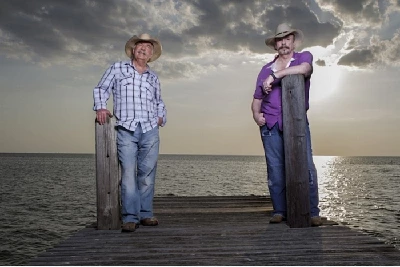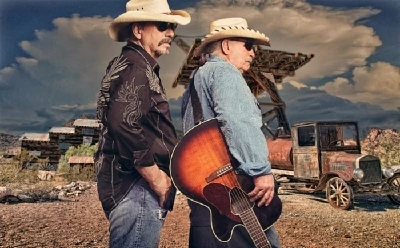published: 23 /
9 /
2019

Adam Coxon speaks to country legends the Bellamy Brothers at a rare UK show about their long forty year career.
Article
With twenty number one singles and over fifty hit singles on the country charts, the Bellamy Brothers are music legends. Together for over forty years and clocking up almost 150 shows every year, the real life brothers show no signs of slowing down.
Pennyblackmusic went backstage at Kimbolton Castle in Cambridgeshire to meet the brothers at a rare UK show.
PB: So, this is your first time in the UK for how long now?
HOWARD BELLAMY: Well, it's been a long time! I don't remember the last time we were here.
DAVID BELLAMY: It's been a good while. Six to eight years ago.
PB: There's such a huge love for traditional country music over here. We never seem to get many legendary artists like yourselves coming over here to perform.
HB: You guys have a shortage of promoters. We would come here way more often. We come all around here, but for some reason we're always missing the UK. We've never figured it out ourselves.
DB: Yeah, we love the UK!
PB: What is it that keeps you guys on the road in 2019?
DB: You know, as long as we're feeling pretty good, we'll carry on touring. We've been lucky enough to still have most of our health. We still do around 140 shows each year. It keeps us pretty busy. I look around and I see the Stones touring. I see Willie Nelson touring and I don't know if it ever ends or not. Somebody back home was asking my wife about cemetery plots...
HB: ...That's not my favourite subject!
DB: I told her that they're probably going to ship us home from somewhere like Singapore in a box anyway! So, it doesn't really matter.
PB: As long as you're having a good time and your health is there then it's all good.
DB: You know, the band sounds good. There's actually more demand now almost than ever.
PB: Long may it last!
HB and DB: Thank you!
PB: So, your father was a big influence on you both. Was he a musician himself and did he played country music around the house?
HB: He did. We grew up playing with our father and his friends. He had a band as well. It was a very unusual group because they had an accordion in it, a dobro. It was a traditional square dance group that played old Jimmie Rodgers blues. David's first instrument was the accordion by the way.
DB: Well, that was all that was laying around, so that's what I learned to play.
HB: I'm so glad he left it at home!
PB: Did your father encourage you to pursue a career in music?
HB: He discouraged it!
DB: Our dad and the way we grew up, I don't think they knew that you could make a living playing music. They just did it for joy and that's the way we started to play. We didn't really know if you could make a living playing music. Sometimes we're still not sure! When a couple of the first hits came along, he was very proud. I don't think he had a concept of big time show business.
HB: He wasn't convinced, but he picked up the mail and saw the first royalty cheque and then he said, "Maybe you boys made the right decision."
PB: I thought you were going to say when he picked up the truckload of fan mail.
DB: He liked the cheques better!
PB: Is it fair to say that some of your earliest onstage performances were singing back up in the clubs for the likes of Little Anthony and Eddie Floyd? How important was this in your career?
DB: We grew up singing old Jimmie Rodgers songs and country songs with our dad and hymns in the church. We figured out when we got this band together that the more stuff that we learned then the more gigs we could get. So, we would play some rock music, we'd play some country, we'd play some blues, some R&B, anything that people shouted out from the dancefloor because that's the way you got hired.
A lot of the R&B guys were coming through Florida looking for a back-up band and they'd hire you for four or five shows. So, that's how we got to do that. It was quite an experience, especially to go onstage with someone like Eddie Floyd because I didn't know who he was prior to playing behind him. You went on with him, and that was the first time I had seen an artist with a hit record and women going crazy and throwing things at him!
PB: He's quite a performer, isn't he?
DB: Oh, he was amazing!
PB: You guys have obviously achieved so much in your musical careers. What does it mean to have achieved that alongside your brother?
HB: Well, it means a lot. There aren't many brothers that stay together, real brothers for the full run. It's something to be proud of. Our mother would roll over in her grave if she thought any different. So, you're just trying to live it out and it's been pretty damn good. I've had to put up with him for forty-three years!
DB: We've usually been too busy fighting with a record label or somebody else to fight with each other.
HB: We always had to team up.
DB: So, it's kind of always been us and them.
PB: It must be great to have that family back up.
HB: I think that original imprint of having a strong family teaching you to work together is the best way. We were taught to work together from a young age on the ranch.
PB:: It's obviously still working out with you guys living on the same ranch.
DB: That's the old home place.
PB: It's the same place that you grew up on?
HB and DB: Yes.
PB: Wow! I hadn't realised that it was the same ranch, your childhood home. So, it really is home!
DB: Since 1870 our family has been there. When you're in a castle like this, you don't think of that being so old, but in America that's pretty old!
PB: How do you guys approach the songwriting process?
HB: I think the better songs happen when you get the inspiration from somewhere but we obviously can do it in any other way. David is like an obsessed writer. He writes in his sleep! Through the years, either way we've compiled a lot of songs. Some people will hear, but there are some that people may never hear.
PB: Over the years, you became well known for songs that are social commentaries. With that in mind, how did the song, 'Old Hippie', come about?
DB: It was a sort of an idea of a composite character. We had friends that came back from Vietnam and then ourselves of course. It kind of became a character which was a little bit of everybody we knew. Oddly enough, we did a demo of that song in our studio, and I showed it to Howard and said that I didn't think anyone would like the song. I played it and Howard thought it was great and that we needed to cut it, so we did but I still didn't think anyone would like it.
HB: Our producer at the time who was also head of the label was a closet hippie who smoked a lot of pot, and no-one knew except us. There's a funny story about the "friggin'" line. That was the original lyric and, of course, that's the way we recorded it. Little did we know it was going to become a single.
We were in the North East, in Seattle or somewhere, and the record label called us to tell us that they were going to release 'Old Hippie'. They said that we had to change that "friggin'" line to something else or the radio would never play it. So, we flew all the way across the United States to come back and change one word. So, we changed it to "too damned old". The funny part is that when it was released the radio chose to play the original version which said, "friggin'" instead of the damn version. We flew 1,500 miles across the country to change one damned word for nothing.
PB: Thank you.
Special thanks to Howard and David Bellamy, Judy Seale, Louise Harris PR and Clare@ TFE.
Band Links:-
https://bellamybrothers.com/
https://www.facebook.com/bellamybrothe
https://twitter.com/bellamybrothers
Picture Gallery:-
